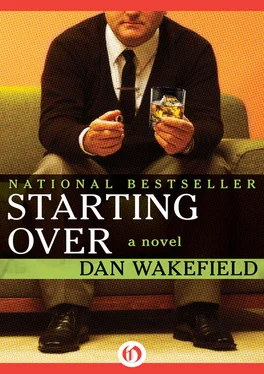Potter was really turned on by her, but he didn’t want to push things. It had been so long since he had really wanted to be with anyone—to talk to them and also to fuck them—that he wanted to nurture it, as he had promised himself he would, wanted to savor the anticipation of their first going to bed, not half-smashed on their first evening out, but fully conscious, slowly, exploringly. He wanted a contemporary version of a “courtship”—that is, not screwing till the second date. But he didn’t think about it in that mechanical or perfunctory manner. He wanted something that he thought of as “real.” He pictured a room with sunlight in it.
He glanced at his watch. It was almost one.
“Listen,” he said, “you probably have to get up at some ungodly hour. I really should go.”
A look passed over her face as if he had slapped her, and he realized he hadn’t yet said anything about meeting again, and hurriedly asked if she could go out Saturday night. And maybe they could do something on Sunday, too. Take a drive or something. To the country.
“That would be nice,” she said, with a noticeable lack of enthusiasm.
“Really, I’d really like it,” he said. “I’d really like to be with you.”
“Well,” she said, “what’s wrong with right now?”
“Right now?” he asked.
He knew damn well what she meant; he felt like a judo wrestler who is suddenly thrown in the position that he uses on other wrestlers. But he had less defense for it.
A man couldn’t say “Why don’t we wait?” A man couldn’t say “I really like you but I’d like to get to know you better.” He couldn’t give any of the woman’s answers for not doing it. It would make it seem he wasn’t a man. It would make him be suspected of being in fact like a woman—effeminate … a fag. Or afraid. Fag. Fraid. Fraid. Fag.
Invited to perform, a man had to perform. Or not be considered a man.
Potter closed his eyes a moment, sloshed down the rest of his Scotch, and pulled her to him. Doing his duty.
It wasn’t exploring or tender, but angry and biting and struggling and mean. That could be nice too, but it just hadn’t been what he had in mind. But he threw himself into it, and she responded in kind.
When it was over, he tried not to think. There was no sunlight in the room; only the luminous glow of the electric alarm clock.
Marilyn invited Potter to her place for dinner. She had chilled a pitcher of martinis, and made some guacamole for an appetizer.
Potter was appreciative. The little things. You wouldn’t find one of your new generation chicks chilling a pitcher of martinis or making guacamole. They’d hand you their stash of grass and some papers to roll a joint with, and later you’d have to send out for pizza and beer.
He was glad he brought Marilyn the dozen roses. The old-fashioned gesture seemed to genuinely please her, and so pleased him in return. He would never have taken roses to a young girl now, fearing the gift would be scorned as trite, or worse, that cutting roses would turn out to be some obscure ecological offense that would brand the giver as another despoiler of the environment, like General Motors or Dow Chemical. It was nice not to have to worry about all that shit. With Marilyn, he could relax. Be himself. Enjoy. And without any skulking kids underfoot, either.
From the stereo came the familiar, sophisticated tinkle of the Modern Jazz Quartet.
They dined by candlelight. Thick lamb chops, spinach, and baked potato with lots of butter and sour cream and chives.
“This is terrific,” Potter said. “It’s better than any restaurant.”
“I like to cook. Especially when it’s appreciated.”
“My appreciation overfloweth.”
“The last couple years I was married, Hank was usually soused by the time we sat down to dinner. God. He was always spilling things. I might as well have fed him from a trough.”
“Yeah. I know how it is. Sometimes Jessie got too loaded to cook. Then we’d both just drink. That was fun.”
“I think it’s really important—eating nicely. It’s sort of what keeps you civilized.”
“Absolutely. It doesn’t have to be fancy or anything. Jessie could cook some real gourmet stuff, but nine times out of ten she’d tell you how it hadn’t come out right, and start apologizing all over the place, and then you couldn’t enjoy the food. You had to keep saying how great it was, and reassuring her at every other bite. You can’t digest that way.”
“No. Or if the other person’s depressed.”
“Oh, brother. I’d rather have a hot dog with a smile than crêpes suzette with a lot of sighs and moans.”
“It’s worse than eating alone, almost.”
“That’s hard too, though.”
“I make myself do it. When I first left Hank and moved in here I got in the habit of coming home and just nibbling on a piece of cheese or eating tuna out of a can or something and I started feeling just lousy. So one night after work I bought a lot of groceries and fixed a beautiful meal for myself, with flowers on the table and the good silver, and I sat down all alone and ate it. I decided I would do that at least once a week, and I’ve stuck to it. And other nights I cook something, even if it’s just a chop and a vegetable.”
Potter pictured Marilyn, alone, going to the store and buying groceries, coming home alone and setting a nice table, and eating her dinner.
“You know,” he said, “you’re braver than I am.”
“Braver?”
“Yes. I mean it. To make a meal just for yourself, and put flowers on the table, and sit down and eat all alone. That takes courage.”
Marilyn lowered her eyes a moment, took a deep breath, then smiled. “Well, let’s not think about it. Right now, we’re together.”
She reached her hand across the table and Potter took it in his own and held it very hard.
“This is nice,” he said.
“Yes. It is.”
As Marva Bertelsen put it, they were “an item” now. They invited the Bertelsens to dinner at Marilyn’s house, Potter pouring martinis and playing the gracious host, expansive and cheery, happy to be able to entertain Max and Marva for once instead of the other way around, feeling he wasn’t a mate-less orphan kid now but a man with a fine woman he admired, an adult joined with another adult in a kind of union, however tenuous or short-lived it might turn out to be. Now it was fine. Marva said she’d never seen Marilyn look so glowing, or Potter so relaxed. Max nodded his benevolent approval. When they left, Max patted Potter on the back and Marva squeezed his hand and said, “We’re happy for you.”
That night Potter and Marilyn made love, long and tenderly. Toward the end, they exchanged the magic words.
“I love you.”
“Oh, I love you .”
They stayed up late, sipping brandy, talking and laughing and touching.
“Oh, Phil,” she said, “I hope it will stay this way.”
“It will,” he assured her. “We’ve both been through enough crap for a while. We deserve this—a good time. Together.”
Monday night Marilyn went to her pottery class, and Potter picked up a fat sandwich at Elsie’s Delicatessen in Cambridge and took it home to have for supper with a cold beer. He was alone for the evening, but not lonely. He felt self-contained, and amiable. It wasn’t bad being alone when you knew another person was out there, a person you’d been with and wanted to be with again, and would be. Both Potter and Marilyn decided it would be silly to start spending every night together, that in fact they could have a better relationship by not trying to absorb each other’s life, but having each other to look forward to, so that meeting and being together would be all the more enjoyable.
Читать дальше












